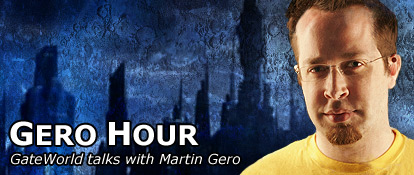
Fan favorite Stargate Atlantis writer Martin Gero was kind to give GateWorld a half hour of his time at The Bridge Studios in Vancouver, British Columbia — the home of Stargate. Sitting comfortably in his office chair he shared his insights in to Season Three of Stargate Atlantis.
Martin has been writing for Atlantis since Season One’s “Childhood’s End,” and has since written one episode for Stargate SG-1. Many of his shows, from “The Storm” to “Grace Under Pressure,” have been firecrackers. Some wonder if he has personal access to the pulse and temperature of Stargate fandom, as his episodes frequently carry with them a lot of what fans crave.
In our audio interview Martin discusses David Hewlett’s real-life sister, Kate, as a possible guest star on Atlantis. (Martin has since confirmed the casting.) He also talks about the difficulty of writing season finales and openers, penning stories for his favorite character, and hints at the upcoming story “McKay and Mrs. Miller” Beware of minor spoilers for this episode!
GateWorld’s interview with Martin Gero is available in MP3 audio format for easy listening, and is about 30 minutes long. It is also transcribed below. You can also download the interview to your MP3 player and take GateWorld with you!
GateWorld: For GateWorld.net I’m David Read and I’m here with one of our buddies, Mr. Martin Gero, writer [of] Stargate Atlantis and one episode of SG-1 from Season Nine. Martin, good to be with you again.
Martin Gero: Thank you, good to be here — in my office! It’s always a treat.
GW: Season Three of Atlantis. They’re shooting episode four downstairs.
MG: That’s correct. Yes, they are shooting episode four.
GW: What is your favorite episode, so far, from the new season? Maybe it hasn’t been shot yet?

Kate Hewlett was reason enough to change the script in “Hot Zone,” and will appear in Season Three of Atlantis.
MG: Of Season Three, my favorite episode has not been shot yet. It’s an episode called “McKay and Mrs. Miller.” It’s an episode that I’ve been wanting to do for about a year now and just haven’t found the right door. It kind of came out of the fact that I was back in Toronto last summer. I saw a play. I’m very cultural. I go out to the theater — the legitimate theater — quite often. And I saw a play starring David Hewlett’s sister, Kate Hewlett, and she was spectacular.
She’s a phenomenal actress, and had a lot of — dare I say “Hewlettisms” — about her. And they have a great chemistry in real life. As you probably already know, probably more than me, they just finished doing a movie together. But after I saw the play this summer I said, “David, I’ve got to do an episode about your sister.” And it’s funny because —
GW: — McKay has one —
MG: — McKay has one. Well, when I wrote “Hot Zone,” and McKay was about to die, I wrote this monologue. Originally I wrote “I’ve got this brother somewhere, and I kind of lost track with him. Could you tell him what happened to me?” And David said “Listen, can I change this from brother to sister, because I actually have a sister who’s an actress, so maybe one day …” I was like, “Sure, sure sure, we can change it to ‘sister.’ We’re never going to cast your sister, though, David.”
And then she was so great in the play, I came back [and thought], “Oh, that could be really interesting.” It’s a neat story about siblings. I have a brother and two sisters. It’s less trouble than McKay’s relationship with his sister. But I think there’s something universal. It’s kind of family and pride. Anyway, It’s quite a funny episode. It’s got this amazing right turn that we’re going to try to keep secret, but God knows I’m sure you guys will tell the whole world before we start shooting.
GW: Aww. Give us more credit than that!
MG: There’s this great turn. It feels like one type of episode then and moves into another type of episode. It’s all very organic. [It’s] one of the hardest episodes I’ve ever had to write just because of that. Usually, because I write fairly quickly, [my] episodes are under. I’m at 45 pages. “Aww, crap. How am I going to fill the next five pages with just stuff, and I have to go back.” This one was like a 65 page first draft and I had to condense down and condense down.
And that’s always the best. It’s always better to have more than less. So this one was a real treat to right and, although hard, I think turned out pretty well.
GW: How does this work? Does McKay’s sister have security clearance?
MG: You’ll have to see.
GW: You’re going to make up your own way to pull her into the scene?
MG: Yeah, yeah. She’s equally brilliant. Let me put it that way. But she has kind of left the physics game. She got pregnant, basically, when she was in university, and decided that being a mother was really important to her. She kind of put that part of her life on hold.
McKay never forgave her for that. He felt that she was potentially more brilliant than even he was — those quiet moments — and feels like the contribution she could’ve made to humanity far outweighs going home and raising a kid. It’s those two schools of thought meeting. It’s about compromise. It’s about accepting who your brother or sister is and trying to find some middle ground with them.
GW: It’s pretty clear that Hewlett and McKay are your favorite actor and character to delve into and write with.
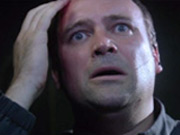
McKay frequently features in Martin’s episodes.
MG: [Smirks] Yeah, I think it is pretty clear.
GW: Is that what you were hoping to achieve with writing this script in terms of McKay’s advancement as a character?
MG: Well, this is kind of the third in a trilogy of McKay-centric episodes that I’ve written. Although I’m gearing up to write a fourth one so it wrecks the whole trilogy.
GW: [Laughter] Quadrilogy!
MG: The first one was “Duet,” of course, which was my first wall-to-wall McKay episode, and then “Grace Under Pressure” which was, I think in a weird way, my favorite episode last year.
GW: “Wide open fields …”
MG: Yeah, yeah. I don’t know, it’s tough. Those two are such a tie. I just watched both of them. A friend of mine was in town and he hadn’t really seen any of my Stargates. I showed him both of those. It’s weird. “Duet” kind of has a warm and fuzzy place with me but I think “Grace Under Pressure” is actually a better episode, in a weird way. So I don’t know.
GW: Why do you think “Grace” is better? “– Under Pressure?”
MG: It’s a better Stargate. It feels more like a really good episode of Stargate as opposed to a different feeling episode of Stargate. I really like “Duet.” I’m not saying “Duet” doesn’t feel like a Stargate episode. It’s got a texture to it that isn’t somewhere where we usually go, whereas “Grace Under Pressure” preserves the texture of a regular Stargate episode and just happens to be really good as well. I don’t know if that makes any sense.
GW: No, it does! It does.
MG: Plus that one was just really hard. “Duet” was fun and easy and “Duet” was kind of like a breath of fresh air for me — after writing, I guess six the first year. It was the first episode where I really felt like I got to showcase more of my voice in McKay a little bit more. Not necessarily my voice, but I like to have fun.
I really enjoy writing the season premieres and the season finales and stuff like that, but those are very different types of episodes to write. That’s a different kind of skill set. It’s all about logistics, and you pepper in the fun. Trying to keep those eleven balls in the air is the most amount of effort, whereas “Duet,” structurally, is actually pretty simple.
It’s all about — usually in a Stargate script a long scene is two and a half pages. There are scenes in “Duet” and in “Grace Under Pressure” that are four, five, five and a half pages. Obviously moving the story forward is not the main goal of a “Duet” or “Grace Under Pressure.” It’s all about those little character moments. Those are just a ton of fun for me to write.
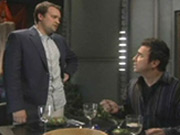
Martin Gero’s episodes frequently become fan favorites.
GW: Your episodes are definitely fan favorites, among a lot of them.
MG: Well, I don’t know about that.
GW: Yeah, from what we’ve been looking at everyone’s shouting them out. How do you feel about fan response for your episodes, from what you’ve read?
MG: Well, if they like it I feel like it is positive. [Laughter] I don’t know. What the fans think is very important, but I don’t pay a lot of attention to it when they don’t like an episode.
GW: Even if it’s constructive?
MG: Well, let me give you an example. A lot of people didn’t like “Grace Under Pressure,” and a lot of people are also sick of McKay episodes and feel that there are other characters that could use the screen time and need developing. I don’t disagree with that. You have to meter out how people approach an episode. If you’re a big McKay fan you’re going to like my episodes — you’re going to like those episodes that I’ve written about McKay. And if you don’t like McKay, then that episode, regardless of how good it is, is going to have to struggle quite a lot for you to like it.
You know, television is really all about the characters. Story to a certain extent, but it really is about characters. I think more so than most shows, fans feel a great ownership over the characters of this series, and I think that’s a wonderful thing. But it also gives them a bias towards episodes. So when a fan responds negatively to an episode that I’ve written, you always kind of have to meter it out where they’re coming from. I take neither personally, and at the end of the day the only thing that really concerns me is the episode I’m working on at the moment.
I mean, I don’t feel like I’ve had any flat-out failures, I don’t think there’ve been episodes where people were like, “This is terrible!” Everyone seemed to really like “Duet,” and some people really didn’t like “Lost Boys,” for instance. And I agree with both of them as to why they don’t like or do like episodes. But at the end of the day my job is to impress Mr. Brad Wright, and as long as Mr. Brad Wright is happy with the work that I am doing, and we don’t feel that we are losing people over the episodes that I’m writing then, you know …
GW: One of the interesting things to me, you say that you really enjoy doing the finales and the opening shows. How much of that is not your own in terms of, “OK, Martin, let’s sit down here. These are the plot points that must be executed for the overall arc of the season, for the overall arc of the show.”
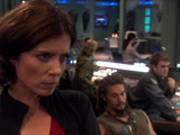
According to Gero, season openers and finales (like “Allies”) are group projects and perhaps should not be attributed to one writer.
MG: Well, there’s some episodes where you kind of feel guilty that yours is the only name on the script. Those are definitely those types of episodes. With season finales and season premieres especially, there’s not a writer on staff that wasn’t in the room when we were discussing the minutiae of every beat. I sit down and go write the dialogue, Brad does his polish and we put it out. But those episodes are team episodes.
To be fair, every episode is team episodes here. No episode gets written in a vacuum. Sometimes even the episodes that we don’t bore together, those episodes go through a pretty extensive editing process. Everyone gives notes on all three drafts of the script as well as, potentially, three drafts of an outline. Everyone gets their stamp on it. It is a team effort. And it’s fun that way, too, because when you suggest a joke — I suggested a joke here, a joke there, and then when it actually makes the screen and gets a big laugh …
It’s a point of animosity for all of us, too, because usually the biggest jokes in each of our scripts is somebody else’s idea. People will come up to you and be like, “My favorite line is that.” You’re like, “Oh, actually yeah, yeah — Brad gave me that line.” Or “Oh yeah, that was actually Joe Mallozzi’s idea. Yeah …” And vice versa — I hope! Writing on a TV show is a team process. It’s funny because the 200th episode this year, of Stargate [SG-1], we all wrote.
Publicity: You’re not going to give away …
MG: No, I would never, I would never. It’s just the cover page here. It looks ridiculous. It’s got everyone’s name on it. Ideally they would all have this, to be honest, but it’s just crazy. The contract that we had to sign to get this episode up and running is ridiculous.
GW: Rainmaker’s going to have fun putting that one on the screen!
MG: Yeah, that’ll be a fun one to tile.
GW: Gosh. What do you feel about the 200th episode in terms of your involvement in it? Brad said that his was the most outlandish portion. Tell us about your portion.
MG: Uh, no. [Laughter]
GW: Not in terms of story but the —
MG: Yeah, I’m not going to say anything about the 200th episode. I really feel like the least we say about this episode the better. The one thing that has gotten out is it is a fun episode in the vein of a “Wormhole X-Treme!” That’s really, I think, all that anybody needs to know. Sorry.

Gero remains tight-lipped about SG-1‘s 200th episode.
GW: No, that’s OK! With the Wraith now fighting amongst themselves and Earth’s [having our own] battleships, how big of a threat are the Wraith in Season Three? I mean, we swoop into battle and they throw weapons at us but our shields are fine. We can declaw them now with the iratus retrovirus. How big a threat are they?
MG: Well, it’s an interesting question because something that we’re doing this year is moving away from Wraith-centered stories. The Wraith are a presence in the galaxy, undeniably, but … You know, it’s interesting. Season One, we were just trying to get our feet beneath us and trying to figure out what kind of stories and what kinds of episodes we wanted to do.
Season Two, for me, for the most part, felt like bigger, better, more confident Season One episodes. Season Three feels like, finally, we’re doing some really fresh and interesting stuff. Part of the way that we’ve been able to do that is move away from Wraith stories, and we’re doing much more stand-alone episodes, as well as introducing a new major villain this year.
GW: The “Hot Zone” villains.
MG: The “Hot Zone” villains. I hesitate to call it a two-parter that Carl wrote, but there are two episodes that are back to back that deal with this new villain, and the second one does it in a really awesome way.
GW: With Weir.
MG: With Weir. So.
GW: Cool.
MG: To get back to the question, the Wraith overpowered the Ancients, and they did so because of their numbers. If the civil war thins out those numbers a little bit then we might have a chance. The other thing to consider, though, is they hibernate. It is possible that a number of them are waking up and then just going back to sleep. I don’t know. I don’t know.
GW: How big of an importance will the Wraith civil war play in Season Three?MG: Not very.
GW: OK, it’s going to be put in the back of their minds.
MG: Yeah.
GW: But it is going on?
MG: It is definitely going on. Yeah. I think out of the first ten episodes, four seems like a lot. Let me put it this way. Of the first fifteen episodes, I think only four are Wraith stories.
GW: Really?
MG: Yeah.
GW: I’ll be darned. Even the two-parter doesn’t deal with them? At least not directly?
MG:The two-parter does not have anything to do with the Wraith. The mid-season two-parter is actually awesome this year.
GW: [Laughter] As opposed to last year!
MG: Well, you know, some people were hot and cold on last year’s two-parter. I share that feeling. I am partially responsible. I don’t feel like they were as good as our last, as “The Storm” and “The Eye.” For a number of reasons. This one is going to feel really neat. Something happens in Act One that I think will come — it feels very much like a series finale. Let me put it that way.
GW: Would it, like, potentially change the direction somewhat of the show? And it’s impact?
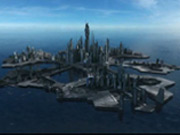
No matter how high the stakes, a syndicated program almost always necessitates pushing the reset button at the end of the hour.
MG: Well, does anything change the direction of the show? The show kind of has a reset after every episode. It’s kind of, by design, the show is hopefully going to air in syndication some day and is meant to be, on some level, seen as single episodes and without having to watch the season from beginning to end.
We try not to serialize the show too much. That’s how you can tell more interesting stories. But, no. At the end of the day the two-parter, things get back to normal but in an incredibly interesting way. It is a phenomenally fun episode, and if all goes well with it, with a guest star that I think people will lose their minds about. Let me put it that way.
GW: Has it already been cast?
MG: Yep.
GW: OK, good. Will this become a continuing threat?
MG: Well, it will have to do, obviously, with our new villains, to some degree.
GW: I’m saying we could finish them off in that mid-season —
MG: — Oh, no no no. The “Hot Zone” villains are going to be around for a while, much as the Replicators were. They are essentially the grandfathers of the Replicators, basically. Because of something that we’ve done they’re not going to be able to be dealt with in the same way as we dealt with the Replicators back in SG-1.
GW: Brad said that this was a very key villain right from the beginning that he’s been planning on introducing. How much input have you had on this creation?
MG: I’m here! I give notes on scripts. People ask my opinions, I give them to them. This is something that Brad has been planning for a long time. When we were writing “Hot Zone” it was a point of contention between a couple of the writers as to who came up with the retrovirus, so we decided to just leave it vague at the end and decide at a later date.
Well, we have decided. There’s kind of a unity in the writers about where to take it. And I was a little anxious, to be honest, that people would, especially fans of the show and of SG-1, be like, “Replicators?!” Most of the reaction has been “Replicators!”
So that’s good. That’s good. They are an awesome villain, and their unique powers lend for some interesting stories. It should be cool. It should be cool. I’m feeling good!
GW: Well, I think that’s good enough for me. The personal actions between the main cast have been regrettably slim. We’ve seen a lot of time with them on duty. We’ve never even seen the interior or Weir’s quarters.
MG: That is fascinating that you said that. I just wrote a scene in Weir’s quarters.
GW: Excellent! [Laughter] Alright! Will we be seeing more of the interpersonal —
MG: Absolutely! I think this year, one of the main goals for us is kind of gelling the team a little bit more. Seeing that off-duty interaction. Certainly the two-parter is going to deal with that heavily. Let me just skim over the episodes here. “Sateda” is a big one about that, definitely, directed by our very own Robert Cooper. “Irresistible” is kind of a fun episode.
GW: They’re shooting right now.
MG: Yeah. Carl’s working on a story right now that should air, I guess nine, that is heavily about everyone’s backstory. We hear people loud and clear that they want to know more about the characters and want to see the characters interact in a less formal way, and we share that feeling, and are moving that direction this year.
GW: Is there one story you’ve always wanted to tell in the Stargate universe but, for one reason or another, you haven’t been able to yet, that’s in the popper right now?
MG: Yes and no. There’s an episode that I want to do but it’s not really a Stargate episode. But I feel like it doesn’t really belong — I’d love to do a Stargate episode that has no jeopardy at all, that is just a Sunday afternoon, essentially, kind of speaking to that off-duty thing, and in vignettes about each character in their off time. Basically five short films about each character. But I’ll probably never do it, to be honest.
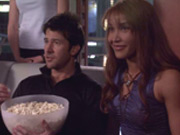
Fans will be promised more personal, off-duty scenes in Season Three.
GW: Pitch it! It sounds like it would be different!
MG: Yeah. That’s probably why I won’t do it.
GW: Brad’s response is: “So what is it about?”
MG: Brad is more adventurous than any of us with the types of stories that he wants to try and tell. It’s got to feel like a Stargate. It’s got to have that science fiction for a science fiction show. The shows don’t work without a certain amount of jeopardy, I think. So I don’t know. It’s on the shelf.
GW: Well, if you could, somehow, insert a little bit of jeopardy into it …
MG: I know. I’ll figure it out someday.
GW: Are you writing any for SG-1 this year?
MG: Aside from the “200,” no. They have more than enough brilliant writers over on the SG-1 side, and Carl, Brad and I are tasked with filling the Atlantis slate this year. Although, we just hired a new guy named Ken Cuperis, who’s an excellent guy. He’s going to write his first episode, “Common Ground,” that I think the fans are going to really like, with Sheppard. The return of Kolya, possibly, and so it’ll be neat.
GW: If we can get Robert Davi up here to do it.
MG: He’ll come. [Laughter] He wanted to come last time. He wanted to come for “Coup D’etat,” and it was written for him, of course. He was in the middle of filming a movie he had written, was directing, and starring in. It’s a heist film, I think, about a do-wap group. It sounds very cool. I’m kind of excited to see it.
GW: You and I were talking online a few weeks ago about “A Dog’s Breakfast,” David Hewlett’s film. What are your feelings about that?
MG: I’m sure it will be excellent. David Hewlett is a very good writer. A lot of people don’t realize that. He is, I’m sure, a steady hand as a director. He had a fantastic crew. The dailies looked great. I haven’t seen a cut yet but I hear it’s going to be a great one.
GW: What do you want to do to, overall, spread your wings this year as a writer? Any particular story that you’re going to — obviously there’s stuff on the drawing board right now. Do you plan to get outside of your box with any of your scripts this year?
MG: Well, I try to get outside of my box with every script. It’s funny. Someone asked the other day — I think I’ve written 16 or 17 scripts for Stargate. “Does it get easier?” And it’s funny, because the producing gets exponentially easier, because you start to develop shorthand with the people you’re working with and can begin to anticipate where miscommunications are going to happen. You kind of get a sense for the machine, whereas writing gets exponentially harder because, even though the stories are new and the characters are ever-evolving, you get into situations where you’re like, “Oh, man, I’ve written this scene four times already.”
There are some scenes that just keep popping up. “Oh, man.This one.” I only have so many clever quips inside me. I know that’s hard for anyone to believe. At a certain point you’re like, “Oh, God. I don’t know if I can write another Stargate episode.” But then you get past [the] first act and you start to get excited about it again. It just all opens up.
Every time you have to take it a step farther, take your envelope out just a little bit larger and take the characters just a little bit deeper. That’s the only way we know how to do it. That’s the only way I know how to do it.
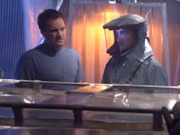
Season Three will bring the “Hot Zone” aliens to the fore.
GW: In the years from now, after Season Three is long-finished, what do you want it to say to fans? To speak to fans?
MG: I would like Season Three to say, as clear as possible: Please let there be a Season Four. We’ve got a lot of stories to go and we’re terribly excited. I think it’ll be interesting this year because this summer we’re going back to just the “Gates” on Friday night. Battlestar has been pushed to October. They’re going to run all 20 episodes, which I think is really interesting. I wish them all the best.
In a way it’s too bad, I think. SCI FI Friday is kind of an exciting thing for science fiction fans, but what’s great is SCI FI’s becoming a bigger and bigger network with more and more original programming. They have too much programming to just put on one night now. So it’s great.
I think this is a make or break year for Atlantis, to be honest — not only for business reasons but just stories. This is the year that I think people — first year you get almost a free pass. Second year I think we were able to hold on to the majority of our audience. But if we don’t do something really interesting and unique this year, I think we’re going to lose people.
And that would be a real shame. Our job is to hold on to the audience we have and grow them. And the only way that we can do that is great stories and great characters, and that’s what we hope to do.
GW: What do you want to say to all the fans who are listening to you right now, who are fans of your work, ourselves, a lot of people.
MG: I guess “Thanks!” I don’t know. It’s kind of a strange question. It’s funny … I was writing. It had never really hit me that people actually watch these episodes. I know that sounds really bizarre, but it’s just so much work to do them and it just feels like you’re doing it to do it. We get the numbers back every week, and it’s like, “Oh, this many people. This many million watched.” But it’s hard to actually picture two and a half million people sitting down to watch something we put together.
I almost can’t think about it, to be honest. It would, I think, be terrifying. So I thank them for liking my work … and I try to think of them as least as possible. In the warmest, warmest sort of way!

